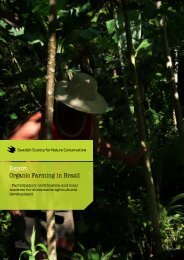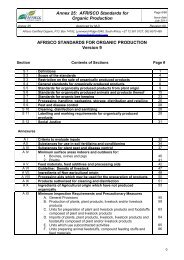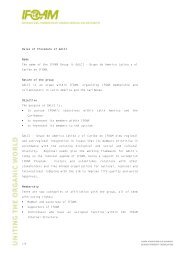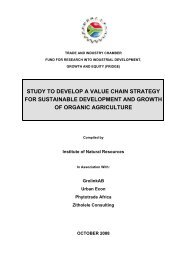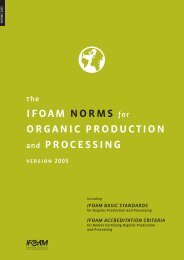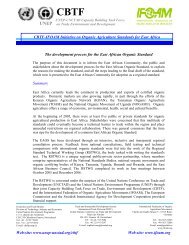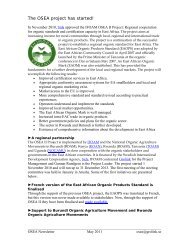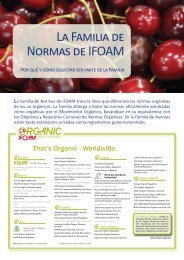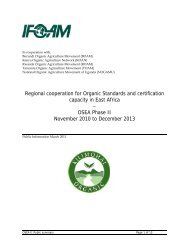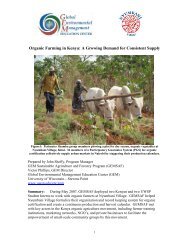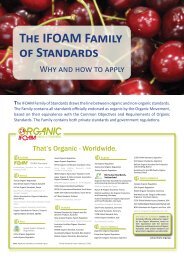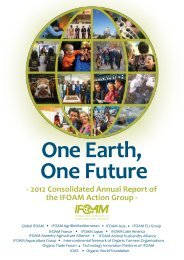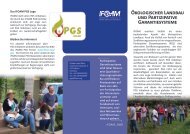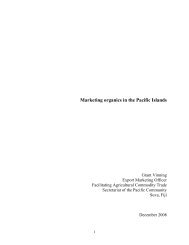Opportunities for Domestic Organic Market in Tanzania - ifoam
Opportunities for Domestic Organic Market in Tanzania - ifoam
Opportunities for Domestic Organic Market in Tanzania - ifoam
You also want an ePaper? Increase the reach of your titles
YUMPU automatically turns print PDFs into web optimized ePapers that Google loves.
<strong>Opportunities</strong> <strong>for</strong> <strong>Domestic</strong><br />
<strong>Organic</strong> <strong>Market</strong> <strong>in</strong> <strong>Tanzania</strong><br />
A Rapid <strong>Market</strong> Scan<br />
carried out <strong>for</strong> EPOPA <strong>Tanzania</strong><br />
May 2004
EPOPA (Export Promotion of <strong>Organic</strong> Products from Africa)<br />
is a development programme <strong>in</strong>itiated by the Swedish<br />
International Development Cooperation Agency, SIDA, <strong>in</strong> 1997.<br />
EPOPA offers African smallholder farmers opportunities <strong>for</strong> improved livelihoods<br />
through the development of organic products <strong>for</strong> export.<br />
The programme has been evaluated twice and has been proven to be a<br />
valid <strong>in</strong>strument <strong>for</strong> African exporters desir<strong>in</strong>g to improve their bus<strong>in</strong>esses<br />
and <strong>for</strong> thousands of farmers want<strong>in</strong>g to improve their livelihoods.<br />
For more <strong>in</strong><strong>for</strong>mation about EPOPA visit: www.epopa.<strong>in</strong>fo<br />
This publication is commissioned by EPOPA.<br />
© EPOPA (2005).<br />
This <strong>in</strong><strong>for</strong>mation can be freely used provided<br />
the orig<strong>in</strong>al document is accurately quoted.<br />
For questions about this document contact:<br />
EPOPA<br />
PO Box 63<br />
6720 AB Bennekom, The Netherlands<br />
Email: d.vanstaaldu<strong>in</strong>en@agroeco.nl<br />
Autor: Ra<strong>in</strong>ard Mjunguli<br />
Co-author and reviewer: Match Maker Associates Ltd.<br />
<strong>Opportunities</strong> <strong>for</strong> <strong>Domestic</strong> <strong>Organic</strong><br />
<strong>Market</strong> <strong>in</strong> <strong>Tanzania</strong>, May 2004<br />
www.epopa.<strong>in</strong>fo 2 (30)
Table of Contents<br />
Executive Summary................................................................................................ 4<br />
1. Background and <strong>in</strong>troduction............................................................... 6<br />
2. Analysis of f<strong>in</strong>d<strong>in</strong>gs............................................................................. 9<br />
3. Summary of research f<strong>in</strong>d<strong>in</strong>gs ............................................................23<br />
4. Conclusions and recommendations .....................................................25<br />
Annexes .......................................................................................................26<br />
List of Tables<br />
Tabel 1. Approach and sampl<strong>in</strong>g techniques ............................................................. 7<br />
Tabel 2. <strong>Tanzania</strong>n products produced and exported <strong>in</strong> 2000/01 ...............................10<br />
Tabel 3. Actors <strong>in</strong> organic agriculture <strong>in</strong> <strong>Tanzania</strong> <strong>in</strong> 2003....................................10-11<br />
Tabel 4. <strong>Organic</strong> retail outlets: Current organic products .....................................12-13<br />
Tabel 5. Summary of opportunities <strong>for</strong> local organic products ...................................16<br />
Tabel 6. Objectives and services of organic (promoter) organisations ........................22<br />
Tabel 7. Recommendations....................................................................................25<br />
Abbreviations<br />
EPOPA<br />
ENVIROCARE<br />
IFOAM<br />
KIHATA<br />
ICS<br />
NGO<br />
TANCERT<br />
ADP<br />
GSC<br />
HIVOS<br />
GTZ<br />
KNCU<br />
ZANZGERM<br />
PCI<br />
KCU<br />
GMO<br />
TBS<br />
ARI<br />
Export Promotion of <strong>Organic</strong> Products from Africa<br />
Environmental, Human Rights Care and Gender Organization<br />
International Federation of <strong>Organic</strong> Agriculture Movements<br />
Kilimo Hai <strong>Tanzania</strong><br />
Internal control System<br />
Non Governmental Organisation<br />
<strong>Tanzania</strong> Certification<br />
Agricultural Development Project<br />
Global Service Crop<br />
Human Institute <strong>for</strong> Development Cooperation<br />
Society <strong>for</strong> technical cooperation<br />
Kilimanjaro Native Cooperative Union<br />
Zanzibar - Germany<br />
Premier Cashew Industries<br />
Kagera Coorperative Union<br />
Genetically Modified Organism<br />
<strong>Tanzania</strong> Bureau of Standards<br />
Agricultural Research Institute<br />
<strong>Opportunities</strong> <strong>for</strong> <strong>Domestic</strong> <strong>Organic</strong><br />
<strong>Market</strong> <strong>in</strong> <strong>Tanzania</strong>, May 2004<br />
www.epopa.<strong>in</strong>fo 3 (30)
Executive Summary<br />
Production and market<strong>in</strong>g of organic products <strong>in</strong> <strong>Tanzania</strong> are still at the<br />
<strong>in</strong>fancy stage despite ef<strong>for</strong>ts by the government of <strong>Tanzania</strong> to launch a<br />
campaign <strong>in</strong> the 1990s aimed at promot<strong>in</strong>g organic agriculture and related<br />
services.<br />
It is from the above factors that EPOPA conducted a rapid market scan to<br />
analyse the market situation and key actors <strong>in</strong> the organic products sector <strong>in</strong><br />
<strong>Tanzania</strong>. The study aimed at assess<strong>in</strong>g the local market demand and supply<br />
<strong>for</strong> exist<strong>in</strong>g and potential organic products <strong>in</strong> <strong>Tanzania</strong>, <strong>in</strong> a bid to suggest<br />
concrete organic market promotional <strong>in</strong>terventions.<br />
The local market has not been developed because of the low level of awareness<br />
about organic products among the population, while access to <strong>in</strong>ternational<br />
market has been slowed down by the high costs of certification of the products.<br />
It came out very clearly that a variety of <strong>in</strong>stitutions and <strong>in</strong>dividual farmers<br />
scattered all over the country are engaged <strong>in</strong> uncertified organic production.<br />
There are <strong>in</strong>stitutions that have been able to certify their products while others<br />
were not able to do so although they are conv<strong>in</strong>ced that their products are<br />
organically produced. However, there is no case of <strong>in</strong>dividual farmers who<br />
were able to certify their products - ma<strong>in</strong>ly due to high costs of certification.<br />
The study revealed that there is a range of organic agricultural products from<br />
<strong>Tanzania</strong>. Some of them <strong>in</strong>clude dried fruits, vegetables, edible oils, jams,<br />
spices, dr<strong>in</strong>ks, cereals, wheat products and animal products. As far as the local<br />
market is concerned, two ma<strong>in</strong> market<strong>in</strong>g outlets were found to exist. The first<br />
is the so-called retail<strong>in</strong>g outlet and the second one is the process<strong>in</strong>g outlet. Both<br />
the outlets are very important <strong>in</strong> the future promotion of local market<strong>in</strong>g of<br />
organic products. The report also cites some examples of <strong>in</strong>stitutions that fall <strong>in</strong><br />
either one or both of the two categories.<br />
The study also revealed that the majority of organic consumers are expatriates<br />
and well to do <strong>Tanzania</strong>ns. A market due to the health beneficiary effects of<br />
organic produce is emerg<strong>in</strong>g among <strong>Tanzania</strong>ns. There are potentials to<br />
develop this market but there is need <strong>for</strong> deliberate promotional ef<strong>for</strong>ts.<br />
Ef<strong>for</strong>ts to promote the local market of organic products must be two-fold. A<br />
first promotional ef<strong>for</strong>t is to raise awareness among the local people so as to<br />
<strong>in</strong>crease understand<strong>in</strong>g <strong>in</strong> the importance of us<strong>in</strong>g organic products. And<br />
second is to make the products easily accessible to them.<br />
In <strong>Tanzania</strong>, it appears that subsistence farmers will be more receptive to<br />
organic agriculture, as most of the farm<strong>in</strong>g practices are quite compatible with<br />
their subsistence farm<strong>in</strong>g practices. Jo<strong>in</strong>t ef<strong>for</strong>ts of projects <strong>in</strong>volv<strong>in</strong>g organic<br />
farm<strong>in</strong>g on the promotion of organic agriculture, plus the support of the<br />
<strong>Tanzania</strong>n government to the organic sector, is a necessity towards an <strong>in</strong>creased<br />
<strong>Opportunities</strong> <strong>for</strong> <strong>Domestic</strong> <strong>Organic</strong><br />
<strong>Market</strong> <strong>in</strong> <strong>Tanzania</strong>, May 2004<br />
www.epopa.<strong>in</strong>fo 4 (30)
awareness amongst the people <strong>in</strong> the country and hence is a highlight <strong>for</strong> future<br />
organic market expansion.<br />
Stockists normally start with a limited range and quantities of products and<br />
then they <strong>in</strong>crease their stocks as the number of customers grows. Most of the<br />
supplies of organically produced commodities <strong>in</strong> the local market are noncertified<br />
products. The only certified products are organic coffee, cashew nuts<br />
and tea. Even <strong>for</strong> the certified organic products, <strong>for</strong> example coffee, special<br />
promotion is required. The supply of organic products has a positive<br />
correlation to the development of projects <strong>in</strong> organic farm<strong>in</strong>g. Most of the<br />
supply of organic products is backed up by external support although to date,<br />
the supply does not meet the demand, especially <strong>for</strong> the export market.<br />
F<strong>in</strong>ally, the study suggested that the promotion of organic agriculture <strong>in</strong><br />
<strong>Tanzania</strong> requires a coord<strong>in</strong>ation of NGOs and bodies of consultancy - like<br />
EPOPA - that have a supportive role to the organic sector. The attention of<br />
promoters of organic agriculture <strong>in</strong> <strong>Tanzania</strong> is critical <strong>in</strong> order to overcome the<br />
supply and demand constra<strong>in</strong>ts identified <strong>in</strong> this study.<br />
<strong>Opportunities</strong> <strong>for</strong> <strong>Domestic</strong> <strong>Organic</strong><br />
<strong>Market</strong> <strong>in</strong> <strong>Tanzania</strong>, May 2004<br />
www.epopa.<strong>in</strong>fo 5 (30)
1. Background and <strong>in</strong>troduction<br />
Production and market<strong>in</strong>g of organic products 1 <strong>in</strong> <strong>Tanzania</strong> are at their <strong>in</strong>fancy<br />
stage. Most of the current organic production <strong>in</strong>itiatives are targeted at the<br />
export market. In this study a number of <strong>in</strong>terested people were <strong>in</strong>terviewed<br />
about their perspective on the organic market <strong>in</strong> <strong>Tanzania</strong>. The issue of organic<br />
farm<strong>in</strong>g seems to be ga<strong>in</strong><strong>in</strong>g momentum and attracts a lot of <strong>in</strong>terest from local<br />
and <strong>in</strong>ternational organisations <strong>in</strong> the country. The development of the local<br />
organic market will have to go a long way <strong>in</strong> creat<strong>in</strong>g an outlet <strong>for</strong> small-scale<br />
producers, giv<strong>in</strong>g <strong>Tanzania</strong>ns an opportunity to benefit from organic products.<br />
The availability of organic products <strong>in</strong> shops will also help to create awareness<br />
among customers of health and environmental issues, which is what organic<br />
agriculture stands <strong>for</strong>.<br />
A systematic documentation of demand and supply of the organic market <strong>in</strong><br />
<strong>Tanzania</strong> is miss<strong>in</strong>g. A number of studies 2 have been done but they are not<br />
exhaustive and their f<strong>in</strong>d<strong>in</strong>gs have not been made public. EPOPA - hav<strong>in</strong>g a<br />
mandate of promot<strong>in</strong>g export markets <strong>for</strong> organic products - has considered it<br />
worthwhile to assess the prospects <strong>for</strong> local market<strong>in</strong>g <strong>in</strong> <strong>Tanzania</strong>. This very<br />
study is a result of this <strong>in</strong>itiative.<br />
Objective<br />
To assess market demand <strong>for</strong> exist<strong>in</strong>g and potential organic products <strong>in</strong><br />
<strong>Tanzania</strong><br />
To design concrete organic market promotional <strong>in</strong>terventions with key<br />
stakeholders<br />
Scope of the study<br />
A market <strong>in</strong> this study is viewed from three angles, i.e. supply, demand and<br />
transaction aspects of organic products <strong>in</strong> <strong>Tanzania</strong> as depicted <strong>in</strong> the sketch<br />
below.<br />
1 <strong>Organic</strong> agriculture is a broad subject. For the sake of this study a work<strong>in</strong>g def<strong>in</strong>ition is adopted which<br />
views organic agriculture as not limited only to certified products but also covers products that are considered<br />
natural, healthy, environmentally susta<strong>in</strong>able etc.<br />
2 We are aware of studies done by Envirocare, EPOPA, and Care which have looked at organic farm<strong>in</strong>g<br />
from different angles, but these have not assessed the opportunities <strong>for</strong> the local market <strong>in</strong> <strong>Tanzania</strong>.<br />
<strong>Opportunities</strong> <strong>for</strong> <strong>Domestic</strong> <strong>Organic</strong><br />
<strong>Market</strong> <strong>in</strong> <strong>Tanzania</strong>, May 2004<br />
www.epopa.<strong>in</strong>fo 6 (30)
Figure 1: Scope of the study<br />
Demand<br />
Consumers? Motives? Awareness?<br />
Supply<br />
Products? Suppliers? Substitution?<br />
Transaction<br />
<strong>Market</strong> Size? Pric<strong>in</strong>g Issues?<br />
In analys<strong>in</strong>g these three sides of the market the key drivers of market<strong>in</strong>g,<br />
namely the product, the price, the market place, its promotion and the people<br />
(consumers) are taken <strong>in</strong>to account.<br />
Apart from the above def<strong>in</strong>ed scope, this study was designed to be a rapid scan<br />
provid<strong>in</strong>g only an overview without <strong>in</strong>to details. The study is also selected to<br />
trace market dynamics <strong>in</strong> the cities of Arusha and Dar es Salaam. No field visits<br />
were <strong>in</strong>corporated <strong>in</strong> this scann<strong>in</strong>g, as these seem to have been covered well by<br />
a number of promotional organisations.<br />
Approach & methodology<br />
This study was undertaken <strong>in</strong> three <strong>in</strong>terdependent stages as follows:<br />
Review of secondary <strong>in</strong><strong>for</strong>mation and <strong>in</strong>terviews with suppliers and customers<br />
of organic products from Dar-es-Salaam and Arusha to f<strong>in</strong>d out how local<br />
market evolves. It is assumed that these are the ma<strong>in</strong> areas where organic<br />
products are be<strong>in</strong>g marketed.<br />
Rapid scan of possible suppliers and promoters of organic produce. Dur<strong>in</strong>g this<br />
exercise a questionnaire (see Appendix 1 & 3 ) was employed. Some big<br />
supermarkets <strong>in</strong> Dar-es-Salaam and Arusha were visited. Out of these<br />
Individual respondents were randomly chosen.<br />
Presentation of the f<strong>in</strong>d<strong>in</strong>gs dur<strong>in</strong>g a meet<strong>in</strong>g of key stakeholders, such as<br />
Envirocare, PAMOJA, Tancert, Kihata and selected private sector companies.<br />
Through this meet<strong>in</strong>g it was expected to achieve the follow<strong>in</strong>g: Validate the<br />
results from the market scan and generate a shared view of the product-market<br />
mix (which products <strong>for</strong> whom?). In essence EPOPA feels that all key<br />
stakeholders should participate <strong>in</strong> this exercise.<br />
The follow<strong>in</strong>g table <strong>in</strong>dicates the approach and the sampl<strong>in</strong>g techniques that<br />
were employed <strong>in</strong> this study.<br />
<strong>Opportunities</strong> <strong>for</strong> <strong>Domestic</strong> <strong>Organic</strong><br />
<strong>Market</strong> <strong>in</strong> <strong>Tanzania</strong>, May 2004<br />
www.epopa.<strong>in</strong>fo 7 (30)
Table 1: Approach and sampl<strong>in</strong>g techniques<br />
Targeted Respondents Sample size Sampl<strong>in</strong>g method<br />
Suppliers of <strong>Organic</strong> products<br />
(Dar-es-Salaam and Arusha)<br />
Buyers (f<strong>in</strong>al consumers) of<br />
organic products<br />
All specialised ones plus a few<br />
non-specialised (upcom<strong>in</strong>g<br />
supermarkets)<br />
As many as possible<br />
Questionnaire<br />
Observation<br />
At each specialised shop<br />
through stratified sampl<strong>in</strong>g (by<br />
<strong>in</strong>come bracket, and location)<br />
Promotional Organisations 15 potential organisations Questionnaire to be replied<br />
through email<br />
Limitation<br />
This study is meant to provide an overview and to be used as a basis <strong>for</strong><br />
<strong>in</strong>itiat<strong>in</strong>g dialogue among promoters of organic market <strong>in</strong> <strong>Tanzania</strong>.<br />
The completeness of the current picture of the organic market <strong>in</strong> <strong>Tanzania</strong><br />
depends very much on the will<strong>in</strong>gness of the approached actors to cooperate <strong>in</strong><br />
provid<strong>in</strong>g <strong>in</strong><strong>for</strong>mation requested <strong>for</strong> <strong>in</strong> this study. Quite a few organisations<br />
anticipated to be promot<strong>in</strong>g organic farm<strong>in</strong>g did not respond to the<br />
questionnaire. Some major outlets were hesitant to cooperate <strong>for</strong> fear of<br />
competition.<br />
Organisation of the report<br />
The report is organised <strong>in</strong> four chapters. The first chapter is the <strong>in</strong>troductory<br />
chapter. The second chapter highlights the ma<strong>in</strong> f<strong>in</strong>d<strong>in</strong>gs of the study presented<br />
<strong>in</strong> the supply, demand and transactions sub chapters. The chapter also<br />
highlights ma<strong>in</strong> f<strong>in</strong>d<strong>in</strong>gs from other reports that were studied. The third<br />
chapter summarises the ma<strong>in</strong> f<strong>in</strong>d<strong>in</strong>gs especially on opportunities <strong>for</strong> the local<br />
organic market. The last chapter presents conclusions and recommendations.<br />
<strong>Opportunities</strong> <strong>for</strong> <strong>Domestic</strong> <strong>Organic</strong><br />
<strong>Market</strong> <strong>in</strong> <strong>Tanzania</strong>, May 2004<br />
www.epopa.<strong>in</strong>fo 8 (30)
2. Analysis of f<strong>in</strong>d<strong>in</strong>gs<br />
Status of the organic sector <strong>in</strong> <strong>Tanzania</strong><br />
In the 1990s the <strong>Tanzania</strong>n government expressed special emphasis that aimed<br />
at the promotion of organic agriculture and its related services. This <strong>in</strong>itiative<br />
encouraged organisations and projects <strong>in</strong>volved <strong>in</strong> organic agriculture <strong>in</strong> the<br />
country. Presently there are many organisations and programmes that promote<br />
organic agriculture <strong>in</strong> <strong>Tanzania</strong>. Some of these are:<br />
The Global Service Corpse (GSC) programme<br />
Meatu cotton organic Project (<strong>in</strong> Meatu)<br />
Export Promotion of <strong>Organic</strong> products from Africa- EPOPA<br />
Natural crop protection <strong>in</strong> Mgeta-Morogoro district<br />
<strong>Organic</strong> vegetable farm<strong>in</strong>g <strong>in</strong> Zanzibar<br />
Improvement of organic coffee<br />
INADES Formation<br />
KIHATA<br />
Envirocare<br />
Care <strong>Tanzania</strong><br />
GTZ <strong>Organic</strong> project<br />
As a result of these <strong>in</strong>itiatives different types of organic products grow fast,<br />
especially <strong>for</strong> export. The picture that emerges is that demand <strong>for</strong> export is not<br />
be<strong>in</strong>g met.<br />
A study Exporter of organic agriculture <strong>in</strong> <strong>Tanzania</strong> carried out by EPOPA <strong>in</strong> Feb.<br />
/ 2004 depicted that <strong>in</strong>efficient support by the government and limited supply<br />
of bio <strong>in</strong>puts are amongst the problems limit<strong>in</strong>g organic agriculture<br />
development <strong>in</strong> <strong>Tanzania</strong>.<br />
The study showed that most product s which are produced and certified as<br />
organic are dest<strong>in</strong>ed <strong>for</strong> export. Table 2 <strong>in</strong>dicates the status of what was<br />
produced and exported <strong>in</strong> 2000/01 agricultural season.<br />
<strong>Opportunities</strong> <strong>for</strong> <strong>Domestic</strong> <strong>Organic</strong><br />
<strong>Market</strong> <strong>in</strong> <strong>Tanzania</strong>, May 2004<br />
www.epopa.<strong>in</strong>fo 9 (30)
Table 2. <strong>Tanzania</strong>n products produced and exported <strong>in</strong> 2000/01<br />
No Firm Product 3 Location Dest<strong>in</strong>ation<br />
1 KNCU Coffee Kilimanjaro In-conversion 4<br />
2 ZANZGERM G<strong>in</strong>ger, pepper,<br />
turmeric, chilli, and<br />
lemon grass<br />
Kigoma, Tanga and<br />
Zanzibar<br />
Germany<br />
3 MTC Processed tea Njombe Europe<br />
4 PCI Cashew nuts Mkuranga<br />
5 CSOD Lemon grass oil,<br />
eucalyptus oil and<br />
sweet basil oil<br />
Zanzbar<br />
Switzerland<br />
6 KCU Clean coffee Bukoba rural,<br />
Muleba<br />
Sweden, Germany<br />
and Uk<br />
7 BIOLANDS Cocoa Kyela EEC, and USA<br />
8. Matunda Mema Dried fruits Bukoba Germany<br />
Source: Adah Mwasha, 2004<br />
S<strong>in</strong>ce 2000/01 many more new actors have come <strong>in</strong>to the organic market.<br />
Table 3, shows the status <strong>in</strong> 2003:<br />
Table 3. Actors <strong>in</strong> organic agriculture <strong>in</strong> <strong>Tanzania</strong> <strong>in</strong> 2003<br />
Producer Products produced/exported Comments<br />
Kimango farm Enterprises<br />
Zanz-Germ<br />
The Zanzibar state Trad<strong>in</strong>g<br />
cooperation<br />
Daimon Golden Apis Chunya-<br />
Mbeya region<br />
Small holder coffee producers<br />
<strong>in</strong> Kagera<br />
Kyela<br />
Small scale farmers <strong>in</strong> S<strong>in</strong>gida<br />
and Babati<br />
Biore <strong>Tanzania</strong> <strong>in</strong> Meatu-<br />
Sh<strong>in</strong>yanga region<br />
ADP Isangati Trust Fund-<br />
Mbeya region<br />
Herbs and spices, fresh and dried<br />
fruits, herbal tea, lemon grass and<br />
chillies<br />
Export herbs and spices<br />
Export essential oils<br />
Export honey<br />
Grow coffee<br />
Grow cocoa<br />
Honey, pigeon peas, ground nuts,<br />
sunflower and sugar<br />
Produce cotton<br />
Grow turmeric<br />
They require<br />
market l<strong>in</strong>k and<br />
quality control<br />
ICS, require<br />
certification<br />
service. No<br />
identified exporter<br />
yet<br />
certified<br />
3 It is reported that <strong>in</strong> 2000/01 season about 1,725.6 metric tons of organic products were exported.<br />
4 Still under conversional period/not yet organic certified<br />
<strong>Opportunities</strong> <strong>for</strong> <strong>Domestic</strong> <strong>Organic</strong><br />
<strong>Market</strong> <strong>in</strong> <strong>Tanzania</strong>, May 2004<br />
www.epopa.<strong>in</strong>fo 10 (30)
(Table. 3 cont<strong>in</strong>ued. Actors <strong>in</strong> organic agriculture <strong>in</strong> <strong>Tanzania</strong> <strong>in</strong> 2003)<br />
Producer Products produced/exported Comments<br />
Balangai tea estate <strong>in</strong><br />
Korogwe-Tanga region<br />
Herkulu tea estate <strong>in</strong> Lushoto-<br />
Tanga region<br />
Muf<strong>in</strong>di tea company – Ir<strong>in</strong>ga<br />
region<br />
Grow tea<br />
Grow tea<br />
Grow and export tea<br />
Tabora bee keepers<br />
association<br />
Ihende Investment, tom<br />
Duville <strong>in</strong> Muf<strong>in</strong>di-Ir<strong>in</strong>ga region<br />
Produce honey<br />
Produce honey<br />
Require diversified<br />
market l<strong>in</strong>ks<br />
Require diversified<br />
market l<strong>in</strong>ks<br />
AMKA <strong>in</strong> Moshi Dried fruits ICS, Certification<br />
MTC Tea Require market<br />
diversification l<strong>in</strong>ks<br />
Source: <strong>Organic</strong> Food Production and certification <strong>in</strong> <strong>Tanzania</strong> - workshop report by<br />
Envirocare, 2003.<br />
From the secondary data it is evident that <strong>Tanzania</strong> produces quite a range of<br />
organic products. However, these products are ma<strong>in</strong>ly <strong>for</strong> the export market.<br />
The next sections try to establish the situation of the local market.<br />
Supply of organic products <strong>for</strong> the local market <strong>in</strong> <strong>Tanzania</strong><br />
The analysis of the supply sources <strong>for</strong> local organic markets <strong>in</strong> <strong>Tanzania</strong> has<br />
been divided <strong>in</strong>to two ma<strong>in</strong> categories, namely the retail<strong>in</strong>g outlets and the<br />
process<strong>in</strong>g outlets. The retail<strong>in</strong>g outlets have been further subdivided <strong>in</strong>to<br />
specialised and non-specialised outlets. The research is based on Dar es Salaam<br />
and Arusha towns.<br />
Specialised retail outlets<br />
There are three specialized retail outlets <strong>in</strong> Dar-es-Salaam. These are Mums<br />
Kitchen, Envirocare and Vitality shops.<br />
These shops started <strong>in</strong> 2000 (Mum’s kitchen), 2003 (natural products shop -<br />
Envirocare) and 2004 (Vitality). Mum’s Kitchen started its bus<strong>in</strong>ess when the<br />
owner learned from a relative who was do<strong>in</strong>g research on the organic sector<br />
about the market niche to be explored <strong>in</strong> Dar-es-Salaam. Others like Envirocare<br />
aimed at advertis<strong>in</strong>g farmers’ products from Kilimanjaro farmers’ group with<br />
the aim to empower farmers economically, while publiciz<strong>in</strong>g Envirocare at the<br />
same time. Vitality is a new outfit established solely <strong>for</strong> South African<br />
medic<strong>in</strong>al products. All these shops are legally licensed. A summary of their<br />
range of products and their sources is provided <strong>in</strong> Table 4.<br />
<strong>Opportunities</strong> <strong>for</strong> <strong>Domestic</strong> <strong>Organic</strong><br />
<strong>Market</strong> <strong>in</strong> <strong>Tanzania</strong>, May 2004<br />
www.epopa.<strong>in</strong>fo 11 (30)
Table 4. <strong>Organic</strong> retail outlets: Current organic products<br />
Product<br />
Supply source<br />
Mum’s kitchen Envirocare<br />
1. Vegetables * * Lushoto<br />
Lemon glass, Lettuce * Lushoto<br />
Broccoli * Lushoto<br />
Round potatoes * Lushoto<br />
Red & white onions * Usambara<br />
Beet root * Lushoto<br />
Red cabbage * Lushoto<br />
Cucumber * Lushoto<br />
Carrots * Lushoto<br />
Tomatoes * Lushoto<br />
Leak * Lushoto<br />
Dried (green) vegetables * Mwanga (Evel<strong>in</strong> women group)<br />
Rosella * Arusha and Mwanga<br />
Dried mushrooms * Mwanga<br />
2. Jams<br />
Mango * Lushoto<br />
Passion * Golden African<br />
P<strong>in</strong>eapple * Golden African<br />
Banana * Golden African<br />
Straw berry *<br />
Goose berry *<br />
Mispel *<br />
3. Spices<br />
Tea * Lut<strong>in</strong>di tea farm<br />
G<strong>in</strong>ger * Usambara<br />
C<strong>in</strong>namon * Lushoto<br />
Turmeric * Usambara<br />
4. Cereals<br />
Brown rice * Golden African<br />
Rye flour * Lushoto<br />
Wheat flour * Lushoto<br />
Lishe * Dar (Kawe)<br />
Soya * Arusha<br />
Red beans * Golden African<br />
Chicken beans * Golden African<br />
Lentils * Golden African<br />
<strong>Opportunities</strong> <strong>for</strong> <strong>Domestic</strong> <strong>Organic</strong><br />
<strong>Market</strong> <strong>in</strong> <strong>Tanzania</strong>, May 2004<br />
www.epopa.<strong>in</strong>fo 12 (30)
(Table 4 cont<strong>in</strong>ued. <strong>Organic</strong> retail outlets: Current organic products)<br />
Product<br />
5. Dr<strong>in</strong>ks<br />
Supply source<br />
Mum’s kitchen<br />
Envirocare<br />
Passion * Lushoto<br />
Raspberry * Lushoto<br />
Orange * Lushoto 7 Golden African<br />
Soya * Lushoto<br />
W<strong>in</strong>e (red & white, sweet<br />
and dry)<br />
6. Bread<br />
* Lushoto<br />
Rye bread * Lushoto<br />
Yoghurt full cream * Lushoto<br />
Yoghurt no cream<br />
Lushoto<br />
Cheese * Lushoto<br />
8. Edible Oils<br />
Macadamia * Sakharan<br />
Sunflower * Irente<br />
Palm * Kigoma<br />
Mor<strong>in</strong>ga * Optimal (Dar)<br />
9. Medic<strong>in</strong>al Products<br />
Arovera juice * Processed by Mums Kitchen<br />
Mor<strong>in</strong>ga powder and<br />
seeds<br />
* Processed by Mums Kitchen<br />
St<strong>in</strong>g less bees honey * Dodoma, Golden African,<br />
Mor<strong>in</strong>ga soap * Uganda<br />
Neem soap & oil * * Ade-natural products (Mbezi)<br />
Arovera soap * Mbeya mak<strong>in</strong>i<br />
Cucumber soap * Mbeya mak<strong>in</strong>i<br />
Sea weed * Ade<br />
Cucumber and carrot *<br />
Natural medic<strong>in</strong>es * Rozi Mchange (Arusha) Dakika<br />
group, South Africa<br />
Mango & banana * Mwanga<br />
The table above <strong>in</strong>dicates that the supply sources are quite diverse, rang<strong>in</strong>g<br />
from Arusha, Ir<strong>in</strong>ga, Tanga, Mbeya <strong>in</strong> <strong>Tanzania</strong> to Uganda and South Africa<br />
(<strong>for</strong> Vitality). There are ten major product groups. Typical value cha<strong>in</strong> analysis<br />
<strong>in</strong>dicates that these products have been produced by small scale farmers and<br />
are processed <strong>in</strong> specialised small factories. From there they are transported,<br />
through agents, to retailers from where they reach the consumers. Another<br />
specialized shop, Vitality (not <strong>in</strong>cluded <strong>in</strong> the table), is deal<strong>in</strong>g with natural<br />
medic<strong>in</strong>es supplied from South Africa.<br />
<strong>Opportunities</strong> <strong>for</strong> <strong>Domestic</strong> <strong>Organic</strong><br />
<strong>Market</strong> <strong>in</strong> <strong>Tanzania</strong>, May 2004<br />
www.epopa.<strong>in</strong>fo 13 (30)
Detailed <strong>in</strong><strong>for</strong>mation on each outlet with regards to their perspectives on the<br />
organic market <strong>in</strong> <strong>Tanzania</strong> is provided below.<br />
Mum’s kitchen<br />
Mum’s kitchen is a small shop specialized <strong>in</strong> organic/natural commodities such<br />
as flour, juices, milk products, breads, vegetables, Soya milk, cook<strong>in</strong>g oils, nuts,<br />
and cereals. Table 2 expla<strong>in</strong>s typical products as supplied by this grocery. The<br />
<strong>in</strong>terest <strong>in</strong> engag<strong>in</strong>g <strong>in</strong> organic products commenced <strong>in</strong> 2000 when the owner<br />
learned about the market niche to be explored <strong>for</strong> the huge city of Dar-es-<br />
Salaam. She felt that by provid<strong>in</strong>g organic products, she could make an offer of<br />
nutritious, healthy and ideal products <strong>for</strong> different ailments like diabetes,<br />
cancer, hypertension, ulcers, to list a few. This grocery shop is located at<br />
Morogoro stores, Oysterbay <strong>in</strong> Dar-es-Salaam.<br />
About 90% of Mum’s kitchen’s customers is the expatriate community<br />
<strong>in</strong>clud<strong>in</strong>g tourists and 10% is composed of <strong>Tanzania</strong>ns. These customers<br />
<strong>in</strong>clude health conscious clients and those who can af<strong>for</strong>d organic prices. The<br />
others are those pushed by health requirements especially diabetics and high<br />
blood pressure.<br />
Accord<strong>in</strong>g to Mum’s Kitchen, promotion of their products is achieved through<br />
participation <strong>in</strong> the Dar-es-Salaam International Trade fairs (<strong>for</strong> expansion of<br />
clientele number) and through word of mouth from her clients. At the start, a<br />
cross section of target customers was <strong>in</strong>vited to the shop where they were<br />
exposed to the variety of products <strong>in</strong> stock. They had an opportunity to taste<br />
some of the products.<br />
Irente firm <strong>in</strong> Lushoto is Mum’s kitchen’s major partner, and they collaborated<br />
<strong>in</strong> attract<strong>in</strong>g customers who have rema<strong>in</strong>ed loyal to Mum’s kitchen to date. The<br />
challenge still rema<strong>in</strong>s to establish consistency of supply and reliability. Mum’s<br />
kitchen experiences unstable supply on rye flour and macadamia nuts.<br />
Mum’s Kitchen sources of supply <strong>in</strong>clude Irente farm (Lushoto), Golden<br />
African (Arusha), Njombe, Usambara farm and <strong>in</strong>dividual producers from<br />
Moshi and Arusha. Rye flour and German bread are the two fastest sell<strong>in</strong>g<br />
products. To keep the supply steady Mums Kitchen sometimes has to buy the<br />
raw materials from Njombe and transport it to Lushoto where it is processed. In<br />
return Mums Kitchen buys breads from Lushoto. She is still look<strong>in</strong>g <strong>for</strong> vanilla<br />
and pla<strong>in</strong> cheese products.<br />
Prices of the purchased goods are generally higher than those of the<br />
conventional products. The price <strong>for</strong> a few l<strong>in</strong>es of organic products could be up<br />
to twice of those of conventional products. Hence, price h<strong>in</strong>ders the low-<strong>in</strong>come<br />
earners from buy<strong>in</strong>g these organic products and there are always compla<strong>in</strong>ts<br />
from new customers about too high prices. It is only after hav<strong>in</strong>g discovered<br />
how vital organic foods are that they realise that its good value is worth the<br />
extra money.<br />
<strong>Opportunities</strong> <strong>for</strong> <strong>Domestic</strong> <strong>Organic</strong><br />
<strong>Market</strong> <strong>in</strong> <strong>Tanzania</strong>, May 2004<br />
www.epopa.<strong>in</strong>fo 14 (30)
However, Mum’s Kitchen’s regular customers are prepared to pay a premium<br />
price as long as they are assured that the product is either produced organically<br />
or processed without <strong>in</strong>clusion of preservatives or chemicals as <strong>in</strong> the case <strong>for</strong><br />
jams, pickles, juices and milk products.<br />
The shop is strategically located <strong>in</strong> a prime shopp<strong>in</strong>g centre with<strong>in</strong> Morogoro<br />
stores which gives it access to the present customers. Most of the supply<br />
sources are be<strong>in</strong>g supported by technical assistance from <strong>in</strong>ternational<br />
organisations or missionary communities. There<strong>for</strong>e the owner questions the<br />
susta<strong>in</strong>ability of these supplies <strong>in</strong> absence of external support. The expansion of<br />
her shop is h<strong>in</strong>dered by limited availability of capital. She mentioned a need <strong>for</strong><br />
a credit facility to extend/boost her stock<strong>in</strong>g capacity.<br />
Accord<strong>in</strong>g to this outlet the ma<strong>in</strong> problems <strong>in</strong> the market are:<br />
Limited understand<strong>in</strong>g of the importance of organic products by the largest<br />
part of the <strong>Tanzania</strong>n population.<br />
Impassable roads especially dur<strong>in</strong>g ra<strong>in</strong>y seasons to distant sources of supply<br />
Introduction of fast foods outlets, which retract a potential group of organic<br />
consumers from regular cook<strong>in</strong>g.<br />
Vitality<br />
This grocery shop is founded by a South African lady and located at Oysterbay<br />
<strong>in</strong> Dar-es-Salaam around the Sea Cliff complex. It started about six months ago.<br />
This grocery shop sells organic/natural products orig<strong>in</strong>at<strong>in</strong>g from South Africa.<br />
Most of what is stocked is medic<strong>in</strong>al products.<br />
As the shop is expand<strong>in</strong>g it is <strong>in</strong>terested <strong>in</strong> stock<strong>in</strong>g locally available organic/<br />
medic<strong>in</strong>al products. The list of commodities the- shop would like to be supplied<br />
with immediately <strong>in</strong>cludes nuts, honey, dried fruits and jams. The shop owner<br />
asked <strong>for</strong> samples of locally available organic products and their price list<br />
be<strong>for</strong>e she could make any firm orders.<br />
Envirocare<br />
This shop is close to the Envirocare office, situated at Survey area <strong>in</strong> Dar-es-<br />
Salaam. Quantities sold have been <strong>in</strong>creas<strong>in</strong>g very quickly. For example the<br />
demand <strong>for</strong> natural products triples annually with the exception of honey<br />
which doubles every year. The prices have been stable <strong>for</strong> the past one and half<br />
years. Consumers of natural products come from long distances and are not<br />
homogenous while the majority of those who come <strong>for</strong> honey are adults, with<br />
education up to degree levels (about 90%) and come from around the area.<br />
Publicity is achieved through trade fairs, SADC shows, TNGP and customers.<br />
Customers are ask<strong>in</strong>g <strong>for</strong> cook<strong>in</strong>g oil (organic sunflower oil) and organic w<strong>in</strong>e<br />
(banana/grape). This outlet observed that Mum’s Kitchen is their competitor.<br />
This was not experienced as a threat. Envirocare emphasised that the market<br />
<strong>for</strong> organic products is not well known. Given stable supply <strong>for</strong> cook<strong>in</strong>g oil and<br />
w<strong>in</strong>e they can process orders immediately. Limited awareness and little<br />
<strong>Opportunities</strong> <strong>for</strong> <strong>Domestic</strong> <strong>Organic</strong><br />
<strong>Market</strong> <strong>in</strong> <strong>Tanzania</strong>, May 2004<br />
www.epopa.<strong>in</strong>fo 15 (30)
understand<strong>in</strong>g of the potentials of organic products <strong>in</strong> the population are the<br />
set backs <strong>for</strong> the expansion of this market. The majority of <strong>Tanzania</strong>ns are low<strong>in</strong>come<br />
earners who do not understand why they should <strong>in</strong>cur a premium price<br />
<strong>for</strong> organic commodities and f<strong>in</strong>d these products very expensive. Envirocare<br />
came up with the suggestion that there is a need <strong>for</strong> awareness creation among<br />
the local people and to emphasise on the effects of GMOs.<br />
The summary of the unmet demand by specialized shops is presented <strong>in</strong> table<br />
5.<br />
Table 5. Summary of opportunities <strong>for</strong> local organic products<br />
Product<br />
Demanded by<br />
VITALITY<br />
shop<br />
Envirocare<br />
MUM’S<br />
KITCHEN shop<br />
Jam * *<br />
Spices *<br />
Tea *<br />
Cereals *<br />
Rice *<br />
Flour *<br />
Beans *<br />
Lentils *<br />
Milk *<br />
Yoghurt *<br />
Cheese *<br />
Oil *<br />
Dried fruits *<br />
Nuts *<br />
Honey *<br />
Cook<strong>in</strong>g oil *<br />
W<strong>in</strong>e *<br />
Vanilla *<br />
Pla<strong>in</strong> cheese<br />
products<br />
*<br />
DELI shop<br />
Non specialized outlets<br />
Sea cliff hotel/supermarket<br />
This is one of the most expensive hotels <strong>in</strong> Dar es Salaam. It is located <strong>in</strong><br />
Oysterbay at the sea cliff complex. The management asked straight away <strong>for</strong> the<br />
samples and the price list of locally available organic products to see if they<br />
con<strong>for</strong>m to their quality standards. Soon they expect to open up the sea cliff<br />
<strong>Opportunities</strong> <strong>for</strong> <strong>Domestic</strong> <strong>Organic</strong><br />
<strong>Market</strong> <strong>in</strong> <strong>Tanzania</strong>, May 2004<br />
www.epopa.<strong>in</strong>fo 16 (30)
supermarket and it is then that they shall be <strong>in</strong> the position of hav<strong>in</strong>g concrete<br />
ideas <strong>in</strong> regards to the stock<strong>in</strong>g of organic commodities.<br />
Shoprite<br />
This is a well-established supermarket <strong>in</strong> most of the big cities <strong>in</strong> <strong>Tanzania</strong>. The<br />
supermarket has already established four branches <strong>in</strong> Dar es Salaam and is<br />
seek<strong>in</strong>g to expand. It stocks few organic/natural products like Gouda cheese,<br />
Soya dr<strong>in</strong>k, jams, serous tea, Tapeta tea, <strong>Tanzania</strong> pride, sunflower oil. It is<br />
will<strong>in</strong>g to try out all the available commodities which are up to standard and<br />
only fast sell<strong>in</strong>g ones will be restocked. The supermarket also wants samples<br />
and a price list of available goods. A market<strong>in</strong>g manager, <strong>in</strong> charge of the store<br />
and management, visits the compet<strong>in</strong>g shops to study new commodities. In<br />
pr<strong>in</strong>ciple they do not <strong>in</strong>tend to open a specialised shelve <strong>for</strong> organics and they<br />
would only stock those items that are fast mov<strong>in</strong>g and have assured reliable<br />
supply.<br />
Shoppers plaza<br />
This supermarket is situated along old Bagamoyo road and sells well-processed<br />
and packed stuffs. The purchas<strong>in</strong>g officer of this outlet was eager to see samples<br />
and a price list of locally available organic commodities but he was very much<br />
concerned about packag<strong>in</strong>g and general quality standards.<br />
As it is <strong>for</strong> Shoprite, this supermarket stocks a few organic products like tea but<br />
does not <strong>in</strong>tend to open specialised shelves <strong>for</strong> them.<br />
Deli<br />
This outlet is eager to engage <strong>in</strong> organic products. The management needs to<br />
see the samples and price list of available products. Also the products should be<br />
of high quality standards such as those accepted by <strong>Tanzania</strong> Bureau of<br />
Standards (TBS). Products should be well packed and properly labelled. Deli is<br />
quite aware that the majority of the expected customers will come from the<br />
expatriate community. Provided that locally available organic products<br />
con<strong>for</strong>m to quality standards, Deli would prefer local supplies. The<br />
management <strong>in</strong>sisted that these products should look neat and physically<br />
attractive. Otherwise they would rather go <strong>for</strong> imported commodities. They<br />
also felt that organic products should carry a certificate and if possibly carry the<br />
logos of outlets like Deli.<br />
Processors of organic products<br />
The focus of this part of the study was to identify processors <strong>for</strong> local organic<br />
products <strong>in</strong> <strong>Tanzania</strong>. The study identified six such processors. It should be<br />
noted that processors <strong>for</strong> the export market have already been covered <strong>in</strong> table<br />
1.<br />
Irente farm<br />
This farm has been founded by the Lutheran church. It is based <strong>in</strong> Lushoto –<br />
Tanga region. The farm processes rye flour (German bread), wheat flour,<br />
<strong>Opportunities</strong> <strong>for</strong> <strong>Domestic</strong> <strong>Organic</strong><br />
<strong>Market</strong> <strong>in</strong> <strong>Tanzania</strong>, May 2004<br />
www.epopa.<strong>in</strong>fo 17 (30)
passion juice and plums juice, vegetables, cheese and sunflower oil. Irente farm<br />
is one of the first and well-established sources of natural products <strong>in</strong> <strong>Tanzania</strong>.<br />
Irente farm buys raw materials from farmers and processes them. Also<br />
vegetables are bought <strong>for</strong> bulk<strong>in</strong>g and sell<strong>in</strong>g. For some products (dairy<br />
products) farmers and the church work <strong>in</strong> jo<strong>in</strong>t ventures <strong>in</strong> which farmers<br />
provide the raw materials and Irente farm provides support on <strong>in</strong>vestment<br />
costs to encourage farmers to participate <strong>in</strong> the process<strong>in</strong>g activity.<br />
The recent change <strong>in</strong> management personnel has resulted <strong>in</strong> fluctuat<strong>in</strong>g quality<br />
and quantities of the products supplied from Irente. This has also had effects on<br />
specialised organic outlets which depend ma<strong>in</strong>ly on this source.<br />
Quality Food Products Ltd<br />
The company is deal<strong>in</strong>g with safflower oil production. It is well established and<br />
is based <strong>in</strong> Njiro-Arusha region. Ef<strong>for</strong>ts to convert <strong>in</strong>to organic certified<br />
products are underway, however, currently products are still processed<br />
conventionally and are sold as pesticide free oil. To date all quantities produced<br />
are dest<strong>in</strong>ed <strong>for</strong> the export market. The company has no future <strong>in</strong>tentions to go<br />
<strong>for</strong> the local market. A few consumers who had tested oil from this factory<br />
mentioned that if this product was available <strong>in</strong> shops they would buy it <strong>for</strong><br />
home consumption.<br />
Honey Research Institute - Arusha<br />
The Honey Research Institute is a government <strong>in</strong>stitute. It is based <strong>in</strong> Njiro-<br />
Arusha region and collects, cleans and packs natural honey. Currently the<br />
<strong>in</strong>stitute’s ma<strong>in</strong> study is on the quality of honey; to determ<strong>in</strong>e the water and<br />
sugar content of the honeys from their different production sources. The<br />
<strong>in</strong>stitute and a few out growers manage the beehives.<br />
The <strong>in</strong>stitute is also launch<strong>in</strong>g a research survey <strong>in</strong> the country to assess<br />
peoples’ awareness on honey consumption (to gather reasons why people eat<br />
honey) and at the same time as a means to ga<strong>in</strong> publicity. About one ton of<br />
honey is produced per year and sold to different customers <strong>in</strong> the country.<br />
There are great opportunities to <strong>in</strong>crease production but a limited supply of<br />
conta<strong>in</strong>ers has been their ma<strong>in</strong> setback. In the meantime the <strong>in</strong>stitute is<br />
discuss<strong>in</strong>g how they can have their products certified organic.<br />
In <strong>Tanzania</strong> there are other sources of honey such as Tabora, Sumbawanga,<br />
Dodoma, Rufiji, S<strong>in</strong>gida etc but they are yet to be certified.<br />
Golden African<br />
Golden African is based <strong>in</strong> Arusha, close to the Tengeru Institute. The company<br />
obta<strong>in</strong>s raw materials from a variety of sources <strong>in</strong> <strong>Tanzania</strong> <strong>in</strong>clud<strong>in</strong>g<br />
Usambara, Tabora, Kilimanjaro and Arusha farmers. It ma<strong>in</strong>ly<br />
processes/manufactures natural products such as jams, honey, juices and<br />
butter. Honey has the fastest sell<strong>in</strong>g trends and the typical labell<strong>in</strong>g (Golden<br />
African) on honey jars has been an attraction to customers, especially tourists.<br />
<strong>Opportunities</strong> <strong>for</strong> <strong>Domestic</strong> <strong>Organic</strong><br />
<strong>Market</strong> <strong>in</strong> <strong>Tanzania</strong>, May 2004<br />
www.epopa.<strong>in</strong>fo 18 (30)
The production manager (Mr. Ayo) mentioned that the local tax<strong>in</strong>g policies do<br />
not favour farmer prosperity and distribution and transportation costs very<br />
much affect the consumer prices. For example a carton of jars transported from<br />
Arusha to Dar-es-Salaam costs Tsh 500/= while the same carton transported to<br />
Mwanza costs Tsh 2500/=.<br />
Golden African is eager to undergo a certification process but does not know<br />
where and how to start. Varied supply sources of raw materials complicate the<br />
certification. The company knew only of the certifier Soil Association based <strong>in</strong><br />
England but the management learnt that neither the factory nor the farmers<br />
could af<strong>for</strong>d the costs <strong>in</strong>volved. Noth<strong>in</strong>g was known about other available<br />
cheaper or local certifiers<br />
They are work<strong>in</strong>g out opportunity costs to <strong>for</strong>ego conversion of papaya-g<strong>in</strong>ger<br />
syrup to organic g<strong>in</strong>ger <strong>in</strong> syrup. However, it was found out that <strong>in</strong>gredients<br />
<strong>for</strong> organic process<strong>in</strong>g are not available.<br />
Royal Palm Hotel<br />
This is one of the biggest hotels <strong>in</strong> <strong>Tanzania</strong> situated along Ohiyo Street <strong>in</strong> Dares-Salaam.<br />
The hotel has offered a variety of organic dishes s<strong>in</strong>ce 1995. Most of<br />
its customers are residents of the hotel - a high calibre group of whom about<br />
90% are <strong>for</strong>eign.<br />
The Royal Palm Hotel has permanent staff serv<strong>in</strong>g <strong>in</strong> the purchase section. A<br />
purchas<strong>in</strong>g officer who organizes orders through tenders heads this section.<br />
The ma<strong>in</strong> source of these natural products is Lushoto, where the contracted<br />
suppliers are also based. Lushoto serves as the collection centre and from where<br />
bulk goods are transported to Dar-es-Salaam.<br />
A survey was <strong>in</strong>itially launched to study the sources and production of these<br />
products as the criteria <strong>for</strong> choos<strong>in</strong>g their supply sources. Dom<strong>in</strong>ant food stuffs<br />
<strong>in</strong>clude round potatoes, lettuce, leak, egg plants, pears, papaya, carrot, tomatoes<br />
and green pepper. Fast sell<strong>in</strong>g goods <strong>in</strong>clude potatoes (200 kg/day), tomatoes<br />
(about 50 kg/day) and carrots (about 20 kg/day). The expansion of their<br />
bus<strong>in</strong>ess depends on orders received from their customers.<br />
Tanica<br />
This is a well-established <strong>in</strong>stant coffee factory based <strong>in</strong> Bukoba region. Initially<br />
it was only produc<strong>in</strong>g conventional <strong>in</strong>stant coffee. Three years ago the factory<br />
engaged <strong>in</strong> organic production but faced some difficulties <strong>in</strong> f<strong>in</strong>d<strong>in</strong>g an<br />
export/organic market. The first batch of 400 kg of organic coffee had no<br />
demand on the organic market. There<strong>for</strong>e it was relabelled back to<br />
conventional. At the time of sell<strong>in</strong>g the coffee as conventional they received the<br />
order <strong>for</strong> 500 kg of organic coffee but could not fulfil it anymore.<br />
Currently Tanica has good contacts worldwide, especially with Japan. Tanica<br />
has already exported 50 kg of organic coffee <strong>for</strong> which they fetched a 20%<br />
<strong>Opportunities</strong> <strong>for</strong> <strong>Domestic</strong> <strong>Organic</strong><br />
<strong>Market</strong> <strong>in</strong> <strong>Tanzania</strong>, May 2004<br />
www.epopa.<strong>in</strong>fo 19 (30)
premium price. However, the company could not <strong>for</strong>esee the reaction of<br />
consumers on organic price premiums on the local market. Accord<strong>in</strong>g to the<br />
production manager, a 20% premium price does not absorb all the additional<br />
production costs. Tanica has learned that packag<strong>in</strong>g coffee <strong>in</strong> t<strong>in</strong>s of yellow<br />
colours does not attract the majority of the local conventional market. On the<br />
other hand, <strong>in</strong> order to w<strong>in</strong> a share <strong>in</strong> the export coffee markets, there should be<br />
additional <strong>in</strong><strong>for</strong>mation on the label such as “put <strong>in</strong> cool and dry place”. Tanica<br />
has experience of pay<strong>in</strong>g US$ 200 per year to local super markets as shelf costs<br />
<strong>for</strong> the promotion of organic coffee.<br />
Based on their long experience <strong>in</strong> the organic sector Tanica suggested that more<br />
ef<strong>for</strong>ts should be put <strong>in</strong>to awareness rais<strong>in</strong>g among consumers, especially on<br />
the health effects of organic produce.<br />
2.5 The demand side<br />
of the organic market <strong>in</strong> tanzania<br />
F<strong>in</strong>al consumers of local organic products <strong>in</strong> <strong>Tanzania</strong><br />
Interviews were carried out with exist<strong>in</strong>g and potential customers of organic<br />
products. Initially, customers of organic products were ma<strong>in</strong>ly <strong>for</strong>eigners of<br />
European orig<strong>in</strong>. Recently a considerable number of <strong>Tanzania</strong>ns start to show<br />
<strong>in</strong>terest. The smallest segment of the market is composed of tourists and<br />
travellers.<br />
This study depicted that the organic market is still at the scratch <strong>in</strong> <strong>Tanzania</strong>. A<br />
small part of the organic customers earn less than Tsh 500,000/= monthly while<br />
the majority comes from a well-to- do category which generates more than Tsh<br />
500,000/= on a monthly basis. It is worth not<strong>in</strong>g that these are elite people with<br />
good educational background. This study reveals that organic products<br />
consumed by <strong>Tanzania</strong>ns <strong>in</strong>clude tea, soya bean, vegetables, honey, cook<strong>in</strong>g oil,<br />
jam, medic<strong>in</strong>es, g<strong>in</strong>ger, chicken, fruits, tomatoes, cashew nuts and others (see<br />
table 2 above).<br />
Most of the respondents mentioned limited availability of organic products as<br />
the reason why they do not get exactly what they want. They are will<strong>in</strong>g to pay<br />
premium prices <strong>for</strong> certified organic products, however, not exaggerated profit<br />
marg<strong>in</strong>s.<br />
Besides the lack of awareness, <strong>for</strong> most <strong>Tanzania</strong>ns also the unavailability of an<br />
appropriate policy on organic products is another setback <strong>for</strong> the growth of the<br />
organic market <strong>in</strong> <strong>Tanzania</strong>. It was also found out that organic products are<br />
quite expensive <strong>for</strong> the majority. To some respondents it was the first time to<br />
hear of organic products show<strong>in</strong>g that they are neither aware of the availability<br />
nor the importance of organic produce.<br />
The same questionnaire was adm<strong>in</strong>istered to secondary school pupils. For the<br />
majority of them it was not clear what organic products are. A few of them had<br />
<strong>Opportunities</strong> <strong>for</strong> <strong>Domestic</strong> <strong>Organic</strong><br />
<strong>Market</strong> <strong>in</strong> <strong>Tanzania</strong>, May 2004<br />
www.epopa.<strong>in</strong>fo 20 (30)
heard about organic products (fruits) from their parents/relatives. Pupils who<br />
are aware of the benefits of organic products suggested that they would accept<br />
the premium prices. The majority of pupils thought that poor education on the<br />
topic is a limit<strong>in</strong>g factor <strong>for</strong> the development of the organic market <strong>in</strong> <strong>Tanzania</strong>.<br />
2.6 Transaction issues on the organic market <strong>in</strong> tanzania<br />
Pric<strong>in</strong>g<br />
There is normally a price premium <strong>for</strong> all organic products found <strong>in</strong> the market.<br />
The exact <strong>for</strong>mula is not clear. Research established that prices range from<br />
between 50% - 100% above conventional prices. For example: The price <strong>for</strong><br />
organic tea (certified) is 77% more, jam 70% more and brown bread 100% more.<br />
Price <strong>for</strong> the same organic products differ between outlets <strong>in</strong> the same city <strong>for</strong><br />
example <strong>in</strong> Dar-es-Salaam at Mum’s Kitchen jam is Tsh 1700/= whilst the same<br />
is Tsh 1900/= at shopprite. The price is heavily <strong>in</strong>fluenced by the transportation<br />
costs from the production areas to the place of consumption. For example,<br />
transport<strong>in</strong>g jam from Arusha to Dar-es-Salaam costs Tsh 500/= per carton,<br />
whilst it costs Tsh 2500/= to Mwanza.<br />
Conclusion<br />
<strong>Organic</strong> products are perceived expensive and this partly affects the size of the<br />
organic market.<br />
<strong>Opportunities</strong> <strong>for</strong> <strong>Domestic</strong> <strong>Organic</strong><br />
<strong>Market</strong> <strong>in</strong> <strong>Tanzania</strong>, May 2004<br />
www.epopa.<strong>in</strong>fo 21 (30)
2.7 Overview of organic promoters<br />
A questionnaire was distributed among all organisations promot<strong>in</strong>g organic<br />
farm<strong>in</strong>g <strong>in</strong> <strong>Tanzania</strong>. Un<strong>for</strong>tunately only a few responded. Below is a short<br />
overview of their responses.<br />
Table 6. Objectives and services of organic (promoter) organisations<br />
ORGANISATION LOCATION OBJECTIVES Involvement <strong>in</strong> organic<br />
market<br />
Isangati ADP Mbeya Rural To contribute to the<br />
ef<strong>for</strong>ts of small older<br />
farmers of Mbeya district<br />
to <strong>in</strong>crease <strong>in</strong>come and<br />
ensure food security.<br />
Envirocare Dar-es-salaam To contribute towards on<br />
go<strong>in</strong>g <strong>in</strong>itiatives of wealthy<br />
creation, promotion and<br />
protection of human right,<br />
gender equality and child<br />
friendly environment <strong>in</strong> a<br />
susta<strong>in</strong>able manner<br />
Have promoted 281<br />
farmers grow<strong>in</strong>g organic<br />
turmeric. In 2003 they<br />
produced 1300 tons.<br />
Promoted 167 farmers<br />
and 11 primary schools <strong>in</strong><br />
Kilimanjaro region<br />
produc<strong>in</strong>g cereal crops,<br />
vegetables, honey and<br />
small animals.<br />
LAMP<br />
Babati<br />
(Arusha)<br />
The general ma<strong>in</strong><br />
objective of the LAMP<br />
program is management<br />
of natural resources <strong>in</strong><br />
Babati district. Soil and<br />
environmental<br />
conservation is one of the<br />
activities – e.g. under crop<br />
improvement and organic<br />
farm<strong>in</strong>g.<br />
Emphasized a need <strong>for</strong><br />
research to determ<strong>in</strong>e<br />
toxicity levels and<br />
application rates <strong>for</strong><br />
botanicals. Promotes 1<br />
farmer group <strong>in</strong> Babati<br />
that grow maize,<br />
sunflower and vegetables.<br />
ARI-Mikochen<br />
Mkuranga-<br />
Coastal region<br />
Research on cash and<br />
food crops<br />
Supports 90 women<br />
(farmers) <strong>in</strong>volved <strong>in</strong><br />
vegetable production <strong>in</strong><br />
Mkuranga district.<br />
CARE TANZANIA<br />
(TUMA UMA<br />
Project)<br />
Kasulu office<br />
Improv<strong>in</strong>g extension<br />
services (collaboration<br />
with local government),<br />
Improv<strong>in</strong>g production<br />
(fertility, crop<br />
management), and<br />
market<strong>in</strong>g of agricultural<br />
products and <strong>in</strong>troduction<br />
of new crops.<br />
Did market study on<br />
maize, beans, oil palm,<br />
honey, g<strong>in</strong>ger, and<br />
horticultural crops <strong>in</strong><br />
2001.<br />
Did market study on<br />
spices (g<strong>in</strong>ger, garlic and<br />
turmeric) 2002.<br />
Promote 702 farmers<br />
produc<strong>in</strong>g honey (8 tons<br />
<strong>in</strong> 2003 year), vanilla and<br />
organic onions <strong>in</strong> Kasulu.<br />
FAIDA<br />
Northern<br />
<strong>Tanzania</strong><br />
To promote market<br />
l<strong>in</strong>kages between small<br />
holder farmer and<br />
markets<br />
Have been <strong>in</strong>volved <strong>in</strong><br />
farmer strengthen<strong>in</strong>g<br />
activities <strong>in</strong> safflower<br />
programme.<br />
<strong>Opportunities</strong> <strong>for</strong> <strong>Domestic</strong> <strong>Organic</strong><br />
<strong>Market</strong> <strong>in</strong> <strong>Tanzania</strong>, May 2004<br />
www.epopa.<strong>in</strong>fo 22 (30)
Although there seems to be a high number of organisations talk<strong>in</strong>g about<br />
organic farm<strong>in</strong>g, <strong>in</strong> this research only six responded. This could mean that<br />
either they are not will<strong>in</strong>g to share <strong>in</strong><strong>for</strong>mation or they are not really competent<br />
<strong>in</strong> organic farm<strong>in</strong>g or the questionnaire/approach was not suitable. This makes<br />
it difficult to have collaborative action as envisaged by EPOPA.<br />
3. Summary of research f<strong>in</strong>d<strong>in</strong>gs<br />
3.1 Demand side<br />
<strong>Organic</strong> agriculture <strong>in</strong> <strong>Tanzania</strong> is at its <strong>in</strong>fant stage and so is its demand. The<br />
majority of <strong>Tanzania</strong>ns have limited awareness and understand<strong>in</strong>g of organic<br />
products. A few, who are well <strong>in</strong><strong>for</strong>med about the importance of organic products,<br />
do not get the desired range of organic products <strong>in</strong> the local market. In<br />
terms of the op<strong>in</strong>ion of the m<strong>in</strong>ority who go <strong>for</strong> organic products, one can easily<br />
po<strong>in</strong>t out that there are no complete product range to satisfy the organic market<br />
as compared to conversional products that are readily available <strong>in</strong> a wide range<br />
of quality and prices. S<strong>in</strong>ce the majority of people cannot understand why organic<br />
products should be sold at higher prices, the premium marg<strong>in</strong>s are not<br />
supported. The offered organic goods appear to be very expensive to the common<br />
consumer. Currently about 90% of the total demand <strong>for</strong> organic produce<br />
comes from the expatriate community. Only 10% of organic customers consist<br />
of local people, ma<strong>in</strong>ly health concerned, elite and high calibre <strong>Tanzania</strong>ns.<br />
In <strong>Tanzania</strong> it appears that subsistence farmers will be more receptive to organic<br />
agriculture compared to their colleagues with larger properties, as most<br />
of the farm<strong>in</strong>g practices are quite compatible with their subsistence farm<strong>in</strong>g<br />
practices. Jo<strong>in</strong>t ef<strong>for</strong>ts of projects on the promotion of organic agriculture, plus<br />
the support of the <strong>Tanzania</strong>n government to the organic sector, are promis<strong>in</strong>g<br />
evidence towards an <strong>in</strong>creased awareness of organic produce and hence highlights<br />
the future expansion of the organic market. Table 3 reveals a list of products<br />
that are on demand by retailers – be<strong>in</strong>g evidence <strong>for</strong> the organic market<br />
growth <strong>in</strong> <strong>Tanzania</strong>. In this study there was no record of dead stock of organic<br />
products <strong>in</strong>dicat<strong>in</strong>g that although small quantities of organic products are supplied<br />
<strong>in</strong> the local market, all of them are be<strong>in</strong>g consumed.<br />
3.2 Supply side<br />
Some salient features of the supply of organic produce <strong>in</strong> <strong>Tanzania</strong> <strong>in</strong>clude:<br />
• Supply often starts by trial and error rather than by design. This is due<br />
to the undeveloped market.<br />
• Stockists start with a limited range and quantities of products.<br />
• Most of the organic supplies to the local market are of non-certified<br />
products.<br />
• The only certified products are organic coffee and tea.<br />
<strong>Opportunities</strong> <strong>for</strong> <strong>Domestic</strong> <strong>Organic</strong><br />
<strong>Market</strong> <strong>in</strong> <strong>Tanzania</strong>, May 2004<br />
www.epopa.<strong>in</strong>fo 23 (30)
• Even <strong>for</strong> certified organic products, e.g. coffee, special promotion is required.<br />
• The supply of organic products has a positive correlation to the development<br />
of projects <strong>in</strong> organic farm<strong>in</strong>g.<br />
• In 1990, the <strong>Tanzania</strong>n government made a special campaign <strong>for</strong> organic<br />
agriculture, which stimulated donor support.<br />
• The supply does not meet the demand of organic products, especially<br />
<strong>for</strong> the export market.<br />
3.3 Transaction side of organic market<br />
The size of the organic market <strong>in</strong> <strong>Tanzania</strong> is relatively small. There is no structured<br />
approach on pric<strong>in</strong>g of organic products. Potential consumers are expatriates<br />
and well- to- do <strong>Tanzania</strong>ns. There is potential to develop this market<br />
but there is also a need <strong>for</strong> deliberate promotional ef<strong>for</strong>ts.<br />
3.4 Promoters of organic agriculture <strong>in</strong> <strong>Tanzania</strong><br />
Promoters of organic agriculture <strong>in</strong> <strong>Tanzania</strong> <strong>in</strong>clude NGOs and consultancy<br />
bodies that play a supportive role to the sector. The attention given to organic<br />
agriculture by promoters <strong>in</strong> the country is highly appreciated despite the fact<br />
that it is still at its embryonic stage. World wide organic agriculture seems to attract<br />
a good number of donors. Among The projects that have been serv<strong>in</strong>g a<br />
supportive role <strong>in</strong> organic agriculture <strong>in</strong> <strong>Tanzania</strong> <strong>in</strong>clude:<br />
• EPOPA (Export Promotion of <strong>Organic</strong> Products from Africa)<br />
• KIHATA<br />
• GSC (the Global Service Crop Programme)<br />
• INADES-<strong>for</strong>mation<br />
• GTZ – organic project<br />
• MEATU (MEATU Cotton <strong>Organic</strong> Project)<br />
• HIVOS<br />
• Global service corpse (GSC) programme<br />
• Natural crop protection <strong>in</strong> Mgeta-Morogoro district<br />
• Improvement of organic coffee<br />
It is evident from this study that there is no coord<strong>in</strong>ation among the various ac<br />
tors. But more critical, there is no concerted ef<strong>for</strong>t to develop the local market as<br />
well as develop<strong>in</strong>g a niche <strong>for</strong> the export market based on the comparative advantage<br />
that <strong>Tanzania</strong> may have (such as <strong>in</strong>creas<strong>in</strong>g number of organic promoters,<br />
<strong>in</strong>creas<strong>in</strong>g local demands on organic products, etc)<br />
<strong>Opportunities</strong> <strong>for</strong> <strong>Domestic</strong> <strong>Organic</strong><br />
<strong>Market</strong> <strong>in</strong> <strong>Tanzania</strong>, May 2004<br />
www.epopa.<strong>in</strong>fo 24 (30)
4. Conclusions and recommendations<br />
Table 7: Recommendations<br />
F<strong>in</strong>d<strong>in</strong>gs/observation<br />
1. Expatriates are the ma<strong>in</strong> consumers of organic<br />
products <strong>in</strong> <strong>Tanzania</strong>.<br />
Recommendation<br />
1. - Promote diversification of organic products.<br />
Further analyses of the demand of this group<br />
2.Very few (10% of a small local market segment)<br />
is <strong>Tanzania</strong>ns due to their limited awareness of<br />
organic produce, low <strong>in</strong>come and unavailability of<br />
the full range of the products desired.<br />
2. A deliberate promotional ef<strong>for</strong>t on the importance,<br />
use, and availability of organic products is required.<br />
In this way the organic market <strong>in</strong> <strong>Tanzania</strong> can be<br />
developed. This should be done be<strong>for</strong>e stimulat<strong>in</strong>g<br />
production. Actors such as the Government,<br />
promot<strong>in</strong>g organisations and farmers’ organisations<br />
should work together. Start<strong>in</strong>g po<strong>in</strong>t is In<strong>for</strong>mation<br />
dissem<strong>in</strong>ation of what is currently available, e.g. <strong>in</strong><br />
trade fairs, radio, television, etc. Consumers and<br />
major outlets who asked <strong>for</strong> samples should be<br />
<strong>in</strong><strong>for</strong>med about promotional ef<strong>for</strong>ts such as trade fair<br />
to give them an opportunity to meet farmer’s<br />
representatives.<br />
3. A variety of natural, environmental, medic<strong>in</strong>al,<br />
healthy/organic products are available <strong>in</strong><br />
<strong>Tanzania</strong>. However, supply is irregular,<br />
pack<strong>in</strong>g/labell<strong>in</strong>g requires improvement, very few<br />
products are certified, and dependent on <strong>for</strong>eign<br />
<strong>in</strong>puts and only small quantities of products are<br />
available.<br />
3. Increased field extension capacity <strong>in</strong> <strong>Tanzania</strong> <strong>in</strong><br />
the organic field to educate the farmers and<br />
certification support. Tra<strong>in</strong><strong>in</strong>g/capacity build<strong>in</strong>g <strong>for</strong> all<br />
those who want to be a promoter of organic sector<br />
with limited knowledge on organic agriculture<br />
4. Exaggerated pric<strong>in</strong>g affects the image of<br />
organic products<br />
4. Pric<strong>in</strong>g should reflect the additional costs of an<br />
organic operational with a reasonable premium and<br />
should not take advantage of the <strong>in</strong>fancy stage of the<br />
sector TanCert could take a lead <strong>in</strong> this case by<br />
help<strong>in</strong>g to set standards.<br />
5. Availability of organic <strong>in</strong>puts is questionable.<br />
(such as organic seeds, etc)<br />
6. All ma<strong>in</strong> supply outlets are will<strong>in</strong>g to stock and<br />
market organic products. However, the<br />
unavailability of a reliable supply of high quality<br />
products is a bottleneck.<br />
5. Specialized centres to deal with organic <strong>in</strong>puts<br />
should be established by the government and other<br />
support organisations.<br />
6 Development projects <strong>in</strong> organic farm<strong>in</strong>g should<br />
promote the development of the local market by<br />
work<strong>in</strong>g on both the supply and demand side of the<br />
market. A leaflet of the conditions set by the organic<br />
outlets should be made and circulated among all<br />
potential suppliers to be discussed <strong>for</strong> collaborative<br />
action among the organic sector promoters. E.g. to<br />
develop a programme, to strengthen farmer<br />
organisations on market<strong>in</strong>g aspects. The ma<strong>in</strong><br />
organic supply outlets should be <strong>in</strong>vited to local trade<br />
fairs and meet<strong>in</strong>gs with farmers groups.<br />
<strong>Opportunities</strong> <strong>for</strong> <strong>Domestic</strong> <strong>Organic</strong><br />
<strong>Market</strong> <strong>in</strong> <strong>Tanzania</strong>, May 2004<br />
www.epopa.<strong>in</strong>fo 25 (30)
Annexes<br />
Annex 1.<br />
Questionnaire <strong>for</strong> specialized organic supply outlets<br />
Name & Address of Respondent/ Bus<strong>in</strong>ess:<br />
Bus<strong>in</strong>ess Background:<br />
-Year it started:<br />
-Reasons / Motivation:<br />
-Legal <strong>for</strong>m of the bus<strong>in</strong>ess:<br />
-Employment data (Full time, Part time, Men/Women):<br />
Type of <strong>Organic</strong> Product<br />
Orig<strong>in</strong> of the products? Locations/ Name of Producers or traders?<br />
Last 2 years’ (2002, 2003) quantities bought/ sold <strong>for</strong> the ma<strong>in</strong> products?<br />
Current prices (Price List)?<br />
Cost plus freight etc. to the sell<strong>in</strong>g po<strong>in</strong>t <strong>for</strong> the ma<strong>in</strong> products?<br />
How is the product supply cha<strong>in</strong> organised?<br />
Who are you ma<strong>in</strong> customers and their characteristics: (Age, <strong>in</strong>come, location, names,<br />
education)?<br />
How do you reach your customers (publicity)?<br />
Are there certa<strong>in</strong> organic products that customers are regularly ask<strong>in</strong>g <strong>for</strong>, but you do not<br />
stock them yet?<br />
If yes why?<br />
Whom do you consider as your competitor? For which products and why?<br />
What are your feel<strong>in</strong>gs about opportunities <strong>for</strong> organic market growth <strong>in</strong> <strong>Tanzania</strong>? Could<br />
you make specific orders <strong>for</strong> certa<strong>in</strong> products?<br />
What are specific constra<strong>in</strong>ts that you are fac<strong>in</strong>g <strong>in</strong> promot<strong>in</strong>g organic markets <strong>in</strong> <strong>Tanzania</strong>?<br />
What strategies would you recommend to develop organic markets <strong>in</strong> <strong>Tanzania</strong>?<br />
<strong>Opportunities</strong> <strong>for</strong> <strong>Domestic</strong> <strong>Organic</strong><br />
<strong>Market</strong> <strong>in</strong> <strong>Tanzania</strong>, May 2004<br />
www.epopa.<strong>in</strong>fo 26 (30)
Annex 2.<br />
Questionnaire <strong>for</strong> f<strong>in</strong>al consumers of organic products<br />
Name and Characteristics of the respondent:<br />
Name:<br />
Address/ Location:<br />
Age:<br />
Monthly Gross Income: Less 200,000<br />
200,001 – 500,000<br />
500,001 - 1,000,000<br />
More than 1million<br />
Education level:<br />
Employed by whom?<br />
Which organic products do you normally buy / consume?<br />
How did you know of the organic supply sources?<br />
Are you gett<strong>in</strong>g what you want? If not what else would you like to buy?<br />
Are you will<strong>in</strong>g to pay a premium price <strong>for</strong> certified organic products?<br />
If yes, what maximum %age over conventional prices?<br />
What do you consider as ma<strong>in</strong> constra<strong>in</strong>ts <strong>for</strong> the development of organic market <strong>in</strong><br />
<strong>Tanzania</strong>?<br />
<strong>Opportunities</strong> <strong>for</strong> <strong>Domestic</strong> <strong>Organic</strong><br />
<strong>Market</strong> <strong>in</strong> <strong>Tanzania</strong>, May 2004<br />
www.epopa.<strong>in</strong>fo 27 (30)
Annex 3.<br />
Questionnaire <strong>for</strong> non specialized supply outlets<br />
Name and address of Respondent:<br />
Are you plann<strong>in</strong>g to sell organic products? If yes, which products? If no, why?<br />
Who will be your target customers?<br />
Do you <strong>in</strong>tend to buy organic products from <strong>Tanzania</strong> or Import from outside?<br />
Given a steady local availability of stock of the follow<strong>in</strong>g product range (certified/ non<br />
certified) what will be your monthly requirements? And under which conditions?<br />
What will be your ma<strong>in</strong> conditions related to the purchased of organic products?<br />
Questionnaire <strong>for</strong> organisations<br />
1. Name and Address of your Organisation/ Program:<br />
2. Ma<strong>in</strong> objectives and services of your Organisation/ Program:<br />
3. Please fill the sheet on page 2, <strong>for</strong> <strong>in</strong><strong>for</strong>mation about Producer groups/<br />
Products / <strong>Market</strong>s that your organisation/ program is promot<strong>in</strong>g.<br />
4. Have you done any research on local organic market <strong>in</strong> <strong>Tanzania</strong>?<br />
Type of Research When was done? What was the coverage?<br />
5. Any other remark / observation that you wish to share <strong>in</strong> order to<br />
improve the quality of this research?<br />
<strong>Opportunities</strong> <strong>for</strong> <strong>Domestic</strong> <strong>Organic</strong><br />
<strong>Market</strong> <strong>in</strong> <strong>Tanzania</strong>, May 2004<br />
www.epopa.<strong>in</strong>fo 28 (30)
Annex 4.<br />
In<strong>for</strong>mation on Producer Groups that you support<br />
Name<br />
Producer<br />
Org.<br />
No. of<br />
members<br />
Location Products Estimated<br />
volume that<br />
was<br />
produced<br />
last year<br />
(2003<br />
<strong>Market</strong>s<br />
targeted<br />
Your op<strong>in</strong>ion<br />
about the<br />
reliability of the<br />
producers to be<br />
a reliable<br />
supplier of high<br />
quality<br />
products<br />
<strong>Opportunities</strong> <strong>for</strong> <strong>Domestic</strong> <strong>Organic</strong><br />
<strong>Market</strong> <strong>in</strong> <strong>Tanzania</strong>, May 2004<br />
www.epopa.<strong>in</strong>fo 29 (30)
Development through organic trade<br />
S<strong>in</strong>ce the early 1960s there has been a grow<strong>in</strong>g market <strong>in</strong><br />
Europe, Japan and the USA <strong>for</strong> products grown <strong>in</strong> a<br />
susta<strong>in</strong>able manner and without the use of agro chemicals.<br />
The organic market has grown from US$ 13 billion <strong>in</strong> 1998<br />
to US$ 25 billion <strong>in</strong> 2005. This is due to the <strong>in</strong>creas<strong>in</strong>g<br />
environmental concerns by the consumers <strong>in</strong> these<br />
developed countries. As such, they are will<strong>in</strong>g to pay<br />
premium prices <strong>for</strong> certified organic products. Slowly but<br />
surely, governments, as well as development cooperatives,<br />
are recognis<strong>in</strong>g the contributions that organic agriculture can<br />
make to environmental, health, bio-diversity and food<br />
security issues.<br />
The a<strong>for</strong>ementioned situation made <strong>for</strong> an ideal opportunity<br />
<strong>for</strong> African countries to f<strong>in</strong>d premium export markets. Thus,<br />
the EPOPA programme – Export Promotion of <strong>Organic</strong><br />
Products from Africa – was birthed by SIDA <strong>in</strong> 1997.<br />
The first two phases of EPOPA-programme from 1997-2001<br />
and from 2002-2004 proved to be successful. In 2004, more<br />
than 29,000 smallholders participated. It is encourag<strong>in</strong>g to<br />
note that the first two projects <strong>in</strong>itiated by EPOPA, <strong>in</strong>volv<strong>in</strong>g<br />
another 30,000 farmers, are self-susta<strong>in</strong><strong>in</strong>g to this day.<br />
The price that the farmers receive <strong>for</strong> their cash crops is 15<br />
to 40 percent higher. Many farmers report a significant<br />
<strong>in</strong>crease <strong>in</strong> productivity due to more <strong>in</strong>tensive crop<br />
management measures. The farmers also produce their own<br />
food organically.<br />
The farmers also appreciate the extra attention given to<br />
them by the extension workers and generally respond to<br />
that by car<strong>in</strong>g more about farm<strong>in</strong>g.<br />
The higher prices are not achieved by the organic<br />
qualification only but also by better quality products and <strong>in</strong><br />
some cases, by more direct trad<strong>in</strong>g structures. In one<br />
project, the exporter is also on the fair trade coffee register.<br />
These three aspects together resulted <strong>in</strong> a 50 to 100 percent<br />
<strong>in</strong>crease <strong>in</strong> <strong>in</strong>come.<br />
Read more about EPOPA at: www.epopa.<strong>in</strong>fo



